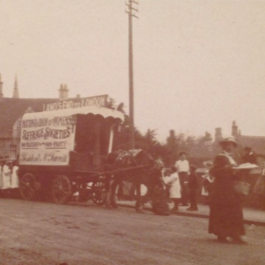The demand for women to have equal political rights with men started in 1866 when a group of women organised a petition. This led to a proposed amendment to the Reform Act that would give women the same political rights as men, put forward by two Members of PArliament, Henry Fawcett and John Stuart Mill who supported universal suffrage. The amendment was defeated by 196 votes to 73. There was support by the men of Britains’s provincial towns, from clergymen, town councillors and small businessmen, and they were often nonconformist Liberal Party supporters. Corsham Councillor N. Fido was a supporter—see page 10.

Suffragists at the top of Church Lane, Box
Just three people from Wiltshire signed the 1866 petition. A Miss Cunnington from Devizes and Miss Lanham and Miss Turner from Claremont House, Corsham. Neither of the Corsham ladies, however, appear to be involved in the suffrage story in later years.
Little is known of Miss Lanham and Miss Turner. Elizabeth Crawford, in her book The Women’s Suffrage Movement in Britain and Ireland, A Regional Survey, say together they ran a ladies’ boarding seminary, Claremont House, Corsham. The 1861 census is the document which provides most information about them. They were living in Pickwick Road; the actual address is not given, though the entry is the next but one to that for Pickwick Villa. Miss Lanham, is the head of the household, aged 32, governess, born in Bath. But her name is shown as “L. Lanham F.(or S) Turner. This is somewhat confusing. There was a family of Lanhams in Corsham; Charles Lanham, the stationmaster, was born in Bath about 1826. I have yet to find Miss Lanham’s history and would be intrigued if anyone can shed any light on her. Miss (Laura Julia) Turner, was a governess aged 29 and her relationship to the head of household was Partner. This in itself is unusual terminology for this time. Her place of birth was also Bath and further research shows she was the daughter of a butcher in Southgate Street. She married in 1873 and by 1891 was a widowed music teacher, boarding in Streatham.
Jane Browning